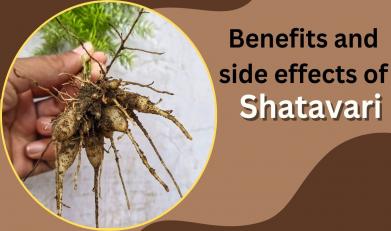

07 Mar, 2024
In the pursuit of natural well-being, Shatavari emerges as a captivating herb with a blend of benefits and considerations. As we delve into the world of Shatavari, renowned for its diverse advantages in women's health, it becomes crucial to navigate the landscape of potential side effects. This blog aims to be your guide, shedding light on both the positive impacts and possible considerations when incorporating Shatavari into your wellness routine. Join us on a journey of discovery as we explore the multifaceted nature of Shatavari, aiming for a balanced understanding of its benefits and side effects.
Shatavari is a medicinal herb that has been used traditionally in Ayurvedic medicine and whose scientific name is Asparagus Racemosus. It is known for its potential health benefits, particularly in supporting women's reproductive health and hormonal balance. Shatavari is often used to address issues such as menstrual irregularities, fertility, and menopausal symptoms.
Shatavari, or Asparagus racemosus, is associated with several potential health benefits, particularly in the realm of traditional medicine. While more research is needed to fully understand and confirm these effects, here are some of the potential health benefits attributed to Shatavari:
Women's Reproductive Health:
Shatavari is traditionally known for its positive impact on women's reproductive health.
It may help regulate menstrual cycles and address conditions like irregular periods.
The herb is believed to support fertility and may be beneficial for women trying to conceive.
Hormonal Balance:
Shatavari is considered an adaptogen, which means it may help the body adapt to stress and maintain hormonal balance.
It is often used to alleviate symptoms associated with hormonal fluctuations, especially during menopause.
Immune System Support:
Some studies suggest that Shatavari may have immunomodulatory properties, potentially supporting the immune system.
Anti-Inflammatory Effects:
The presence of bioactive compounds in Shatavari, such as flavonoids, may contribute to its anti-inflammatory properties.
It may have potential in managing inflammatory conditions
Gastrointestinal Health:
Shatavari has been traditionally used to promote gastrointestinal health.
It may have mild laxative effects and could help in soothing digestive issues.
Adaptogenic Properties:
As an adaptogen, Shatavari is believed to assist the body in adapting to stress and maintaining homeostasis.
Antioxidant Activity:
Shatavari contains antioxidants that may help combat oxidative stress and protect cells from damage.
Diuretic Effects:
The herb may have diuretic properties, aiding in the elimination of excess fluids from the body.
While Shatavari (Asparagus racemosus) is generally considered safe when used in moderation, it's essential to be aware of potential side effects. As with any herbal supplement, individual responses can vary, and it's advisable to exercise caution. Here are some potential side effects associated with Shatavari:
Gastrointestinal Discomfort:
Some individuals may experience mild gastrointestinal issues such as bloating, gas, or upset stomach.
Allergic Reactions:
Allergic reactions are possible, although rare. If symptoms such as rash, itching, or swelling occur, discontinue use and seek medical attention.
Hormonal Effects:
Due to its potential estrogen-like effects, some individuals may experience hormonal changes. Women with conditions like estrogen-sensitive cancers should be particularly cautious.
Interactions with Medications:
Shatavari may interact with certain medications. It's important to consult with a healthcare professional, especially if you are taking medications for diabetes, hormonal conditions, or have kidney issues.
Blood Sugar Levels:
Individuals with diabetes should monitor their blood sugar levels closely, as Shatavari may influence glucose levels.
Shatavari stands as a captivating herbal ally with a rich history steeped in Ayurvedic traditions. Its potential to support hormonal balance, immune health, and overall well-being has sparked a renewed interest in natural remedies. As we navigate the complexities of modern health, Shatavari beckons as a gentle yet powerful companion, offering a holistic approach to nurturing the body.
Embrace the natural harmony of Shatavari and the divine blend of herbs in Divine 9 Powder for a holistic approach to well-being. Elevate your health with the power of herbs, blending ancient wisdom with modern holistic practices.